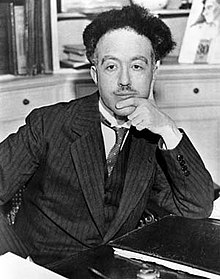Louis de Broglie
Nobel laureate credited to pioneer the discovery of wave character of matter (1892–1987)
Louis de Broglie (15 August 1892 – 19 March 1987) was a French aristocrat and physicist who made groundbreaking contributions to quantum theory. In his 1924 PhD thesis, he postulated the wave nature of electrons and suggested that all matter has wave properties. This concept is known as the de Broglie hypothesis, an example of wave–particle duality, and forms a central part of the theory of quantum mechanics. De Broglie won the Nobel Prize for Physics in 1929, after the wave-like behaviour of matter was first experimentally demonstrated in 1927.

| This article about a physicist is a stub. You can help out with Wikiquote by expanding it! |
Quotes
edit- It seems a little paradoxical to construct a configuration space with the coordinates of points which do not exist.
- La nouvelle dynamique des quanta (1928), translation by Bacciagaluppi, G., Valentini, A. (2009). Quantum Theory at the Crossroads: Reconsidering the 1927 Solvay Conference. Cambridge University Press. p. 380. ISBN 0521814219.
- The history of science shows that the progress of science has constantly been hampered by the tyrannical influence of certain conceptions that finally came to be considered as dogma. For this reason, it is proper to submit periodically to a very searching examination, principles that we have come to assume without any more discussion.
- Will Quantum Physics Remain Indeterministic, in Louis de Broglie (1953). The revolution in physics: a non-mathematical survey of quanta. Noonday Press. p. 237.
- Two seemingly incompatible conceptions can each represent an aspect of the truth … They may serve in turn to represent the facts without ever entering into direct conflict.
- Dialectica, Vol. 2, No. 3/4 (1948), p. 326.
- The actual state of our knowledge is always provisional and … there must be, beyond what is actually known, immense new regions to discover.
- Foreword of book by David Bohm (1984). Causality and Chance in Modern Physics. Routledge. p. x. ISBN 0415174406.
- Admettant que la particule possède une vibration interne qui permet de l'assimiler à une petite horloge, je supposais que cette horloge se déplaçait dans son onde de façon que sa vibration interne reste constamment en phase avec celle de l'onde : c'est le postulat de l'accord des phases.
- Assuming that the particle has an internal vibration which allows to assimilate it to a small clock, I supposed that the clock was traveling with the wave in such a way that its internal vibration remained constantly in phase with the wave's : this is the phase matching postulate.
- Sur les véritables idées de base de la mécanique ondulatoire, Louis de Broglie, C. R. Acad. Sci., 277, série B, 1973, p. 71-73.
- Assuming that the particle has an internal vibration which allows to assimilate it to a small clock, I supposed that the clock was traveling with the wave in such a way that its internal vibration remained constantly in phase with the wave's : this is the phase matching postulate.
External links
edit- Encyclopedic article on Louis de Broglie on Wikipedia
- Media related to Louis de Broglie on Wikimedia Commons